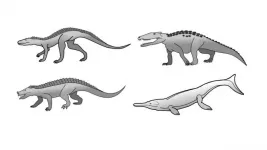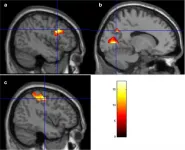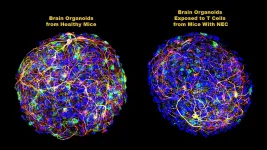Research explains why crocodiles have changed so little since the age of the dinosaurs
2021-01-07
(Press-News.org) New research by scientists at the University of Bristol explains how a 'stop-start' pattern of evolution, governed by environmental change, could explain why crocodiles have changed so little since the age of the dinosaurs.
Crocodiles today look very similar to ones from the Jurassic period some 200 million years ago. There are also very few species alive today - just 25. Other animals such as lizards and birds have achieved a diversity of many thousands of species in the same amount of time or less.
Prehistory also saw types of crocodile we don't see today, including giants as big as dinosaurs, plant-eaters, fast runners and serpentine forms that lived in the sea.
In the new research, published today in the journal Nature Communications Biology, the scientists explain how crocodiles follow a pattern of evolution known as 'punctuated equilibrium'.
The rate of their evolution is generally slow, but occasionally they evolve more quickly because the environment has changed. In particular, this new research suggests that their evolution speeds up when the climate is warmer, and that their body size increases.
Lead author Dr Max Stockdale from the University of Bristol's School of Geographical Sciences, said: "Our analysis used a machine learning algorithm to estimate rates of evolution. Evolutionary rate is the amount of change that has taken place over a given amount of time, which we can work out by comparing measurements from fossils and taking into account how old they are.
"For our study we measured body size, which is important because it interacts with how fast animals grow, how much food they need, how big their populations are and how likely they are to become extinct."
The findings show that the limited diversity of crocodiles and their apparent lack of evolution is a result of a slow evolutionary rate. It seems the crocodiles arrived at a body plan that was very efficient and versatile enough that they didn't need to change it in order to survive.
This versatility could be one explanation why crocodiles survived the meteor impact at the end of the Cretaceous period, in which the dinosaurs perished. Crocodiles generally thrive better in warm conditions because they cannot control their body temperature and require warmth from the environment.
The climate during the age of dinosaurs was warmer than it is today, and that may explain why there were many more varieties of crocodile than we see now. Being able to draw energy from the sun means they do not need to eat as much as a warm-blooded animal like a bird or a mammal.
Dr Stockdale added: "It is fascinating to see how intricate a relationship exists between the earth and the living things we share it with. The crocodiles landed upon a lifestyle that was versatile enough to adapt to the enormous environmental changes that have taken place since the dinosaurs were around."
The next step for the team's research is to find out why some types of prehistoric crocodile died out, while others didn't.
INFORMATION:
[Attachments] See images for this press release:

ELSE PRESS RELEASES FROM THIS DATE:
2021-01-07
Scientists at the University of Birmingham, UK, have shown that a novel low molecular weight dextran-sulphate, ILB® could play a key role in treating open angle glaucoma (OAG), a neurodegenerative disease that affects over 70 million people worldwide and causes irreversible blindness.
OAG develops slowly over many years. Excessive matrix deposition (fibrosis) within the eye's main fluid drainage site can lead to increased intraocular pressure (IOP), resulting in damage to the optic nerve.1
The research, reported in npj Regenerative Medicine, has ...
2021-01-07
The North Sea is a heavily trafficked area, with major shipping routes crossing its waters, and fisheries, offshore oil rigs, and wind farms populating its waves. All this activity inevitably has an effect on marine wildlife, and scientists are particularly interested in how the harbor porpoise population has fared in the face of such disturbances.
The harbor porpoise is known as a "sentinel species" - animals which indicate the health of an ecosystem and point to potential risks (think of the canary in the coal mine). According to a recent study published in Frontiers ...
2021-01-07
A new study in the Oxford Economic Papers finds that migration flows the last 500 years from high sunlight regions to low sunlight regions influence contemporary health outcomes in destination countries.
The researchers here noted that people's ability to synthesize vitamin D from sunlight declines with skin pigmentation, and that vitamin D deficiency is directly associated with higher risk of mortality, from illnesses including cardiovascular disease, type 1 and type 2 diabetes, hypertension, and certain cancers. Recent research even .finds that vitamin D affects the severity of COVID-19.
Researchers here focused on ...
2021-01-07
Sophia Antipolis, 7 January 2021: Patients with acute heart failure nearly double their risk of dying if they get COVID-19, according to research published today in ESC Heart Failure, a journal of the European Society of Cardiology (ESC).1 The small, single centre study highlights the need for patients with heart failure to take extra precautions to avoid catching COVID-19.
"Our results support prioritising heart failure patients for COVID-19 vaccination once it is available," said study lead investigator Dr. Amardeep Dastidar, a consultant interventional cardiologist at North Bristol NHS Trust and Bristol Heart Institute, UK. "In the meantime, heart failure patients of all ages should ...
2021-01-07
Modelling study suggests that pregnant women in India, Pakistan, Bangladesh, who are exposed to poor air quality, may be at higher risk of stillbirths and miscarriages.
An estimated 349,681 pregnancy losses per year in south Asia were associated with exposure to PM2.5 concentrations that exceeded India's air quality standard (more than 40 μg/m³), accounting for 7% of annual pregnancy loss in the region from 2000-2016.
First study to estimate the effect of air pollution on pregnancy loss across the region indicates that air pollution could be a major contributor to pregnancy loss in south Asia, so controlling air pollution is vital for improving maternal ...
2021-01-07
WHO H. Gilbert Welch MD, MPH, Senior Investigator, Center for Surgery and Public Health, Brigham and Women's Hospital; co-author of a new Sounding Board article published in The New England Journal of Medicine.
WHAT Melanoma of the skin is now the third most commonly diagnosed cancer in the U.S. Diagnoses of melanoma are six times as high today as they were 40 years ago. While incidence of melanoma has been rising steeply, melanoma mortality has been generally stable. In a Sounding Board article, Welch and colleagues present evidence for why they believe that increased diagnostic scrutiny is the primary driver of the rapid rise in melanoma diagnoses.
"Melanoma is now the posterchild for overdiagnosis," said Welch. "Although the conventional response has been ...
2021-01-06
DURHAM, N.C. -- Before the pandemic, one-third of U.S. households with children were already "net worth poor," lacking enough financial resources to sustain their families for three months at a poverty level, finds new research from Duke University.
In 2019, 57 percent of Black families and 50 percent of Latino families with children were poor in terms of net worth. By comparison, the rate for white families was 24 percent.
"These 'net worth poor' households have no assets to withstand a sudden economic loss, like we have seen with COVID-19," said Christina Gibson-Davis, co-author of the study and professor of public policy and sociology at Duke University's Center for Child and Family Policy. "Their savings are virtually nil, ...
2021-01-06
The exponential growth of data traffic in our digital age poses some real challenges on processing power. And with the advent of machine learning and AI in, for example, self-driving vehicles and speech recognition, the upward trend is set to continue. All this places a heavy burden on the ability of current computer processors to keep up with demand.
Now, an international team of scientists has turned to light to tackle the problem. The researchers developed a new approach and architecture that combines processing and data storage onto a single chip by using light-based, or "photonic" processors, which ...
2021-01-06
A study led by University of Ottawa researchers provides empirical evidence that mindfulness has a significant impact on the brain of women suffering from neuropathic pain related to breast cancer treatment. The researchers showed that mindfulness-based stress reduction (MBSR) helps modulate neuropathic pain.
Their findings could make a difference in the lives of many women. In Canada, over a quarter of a million women are expected to be diagnosed with breast cancer - the most diagnosed cancer among women worldwide - in 2020. In addition to the psychological impacts of breast cancer, approximately 20 to 50 percent of survivors report experiencing chronic neuropathic pain following treatment.
We talked to senior author Dr. Andra Smith, Full Professor at the uOttawa School of Psychology, ...
2021-01-06
Physicians have long known that necrotizing enterocolitis (NEC), a potentially lethal inflammatory condition that destroys a premature infant's intestinal lining, is often connected to the development of severe brain injury in those infants who survive. However, the means by which the diseased intestine "communicates" its devastation to the newborn brain has remained largely unknown.
Now, working with mice, researchers at Johns Hopkins Medicine and the University of Lausanne in Switzerland have identified that missing link -- an immune system cell that they say travels from the gut to the ...
LAST 30 PRESS RELEASES:
[Press-News.org] Research explains why crocodiles have changed so little since the age of the dinosaurs





